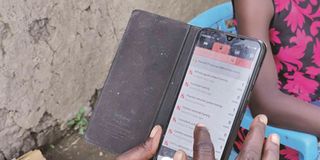Kisumu launches digitised community health services

Pamela Onyango, a CHV, keying in data in a mobile phone after attending to a patient in Nduru, Kisumu. The county has rolled out an electronic Community Health Information system among CHVs.
What you need to know:
- As of December last year, 1,000 of the 2,998 community health volunteers had been trained in basic modules. The training takes place in batches across all sub-counties and the CHVs learn how to undertake their duties and use smartphones.
- Once trained, they also guide their communities on health improvement and disease prevention as well as register households at frequencies stipulated in the current guidelines.
Kisumu County has turned to an electronic Community Health Information System (eCHIS) to boost community health volunteers’ (CHVs’) work.
The CHVs are transitioning from analogue to digital reporting using electronic gadgets after gaining proficiency through technical training.
County Community Health Service coordinator Maureen Opiyo says about 3,000 CHVs will get the gadgets and prepaid airtime to help advocate primary health practices.
The county, in partnership with Living Goods, an NGO, piloted the project last year in Muhoroni and Nyando, where the CHVs used mobile phones to key data collected from outreach visits.
"The old system was expensive for the county government and the data was vulnerable and could easily get lost. But with the digitised system, data entry is easy. Datat can be traced and is credible," says Ms Opiyo.
Initially, the CHVs would move around with bulky books to take note of the data, but with smart phones, it is easy to load the information into the county health data system.
They download and install Smart Health App on their mobile phones. The app is interactive and has guidelines and questionnaires, where the CHVs fill in patients’ information.
"It has made work easier for me, I just need to charge the phone and have internet connection. The app has procedures for various treatments," she says.
The CHVs are now able to track the dates for next visits.
LivingGoods senior advocacy manager Howard Akimala says out of the 152 registered pregnancies in the past three months in the region, 128 deliveries were in hospitals.
"From our data, there were zero maternal deaths in Nyando Sub-county. With continuous household visits, CHVs have been able to increase hospital deliveries," says Mr Akimala.
"The CHVs are also to be provided with smartphones to aid household registration, patient screening, treatment and referrals."
They were all recruited by the county government but depended on different implementing partners for training. After two-week training, they are provided with medical kits.
"The CHVs have undergone two-week training on how to carry out CHV work, which includes household registration, patient screening and referrals," Mr Akimala says.
The volunteers also went through advanced modules training, which involves management of specific conditions such as integrated community case management.
As of December last year, 1,000 of the 2,998 CHVs had been trained in basic modules. The training takes place in batches across all sub-counties and the CHVs learn how to undertake their duties and use smartphones.
Once trained, they also guide their communities on health improvement and disease prevention as well as register households at frequencies stipulated in the current guidelines.
"Likewise, they treat common ailments and minor injuries with support and guidance from community health extension workers," says Mr Akimala.





